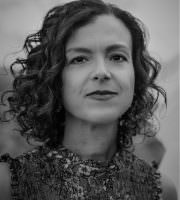by Diane Fahey
1
She must have once had class
since now she prefers
the rubbish bins of Hampstead
to any others — a wealth
of gourmet leavings snatched back
from ashes and greasy paper.
She is dressed for the part
in nondescript layers,
with a green rubbish bag
worn as a cape — to assist those
who have not quite got the message.
Even in a strong wind, unflappable,
she walks straightly down the High Street,
at each stop her delving
conscious and methodical
as a surgeon's, and as unashamed.
With most of what makes up
an existence lost to her, it seems
a miracle that she rises each day
with fresh designs on life,
and passes her time so constructively,
satisfying curiosity, hunger,
and some instinct which tells her
that life evolves from waste —
it is not just what we leave behind us
and where we are going.
2
Always the Alsatian chained to her wrist,
and the twisted foot dragging as she walks.
Always the same dark clothes,
the white ageless face.
Her eyes see me and don't see me
as we pass on our walks
round Hampstead's lanes and streets,
or on the heath. Round and round…
I imagine how long it would take
before she recognised me
as I am beginning to recognise her.
I know that behind her despair
she is still waiting,
that behind that image in black and white
is one who remembers
bending over water to catch
her clear image
and cradling those fresh colours
in her hands… The water,
that image, slipped away.
Those white fingers are twisted
like her foot,
they hold nothing except
the chain attached to the dog —
so docile for such a dangerous breed.
3
With her suet pudding belly
and her eyes round as saucers —
brown and frightened and pleading —
she is the one about whom they say,
"Something should be done; it isn't right',
because she follows you into shops
and asks you to buy her things —
a pound of coffee, those nice chocolates,
some sausages for her tea…
She waits around for you
so you wear that special worried look
and hurry faster to nowhere in particular.
She provokes disbelief, high dudgeon,
as she haunts the neighbourhood,
always disconsolate,
longing for some nourishment
that food cannot provide —
she could eat the whole world
and never be satisfied.
It's lucky we don't feed her much,
she'd only want more and more and more.
What they say is true,
the high-minded and the well-fed —
something should be done;
it isn't right.
4
She is the one I don't want to own
any part of.
She is small and wrinkled and nasty and old:
storybook witch,
copybook harridan,
she rails at you in the street,
not seeing you, yet sharp as a needle
pricking your reasonable, feeling self
with her rubbish
about Pakistanis,
and the supermarket where you can't get real jam,
and the government is late sending her cheque
it's all a plot
so she screams at them in the post office
which is full of Pakistanis so it's all their fault
coming here to get free medicine let them rot in the gutter…
She sneezes her peppery malice round the neighbourhood;
in mellow moods
talks of the old ways, better days…
She is four foot six,
her hair is yellowy white,
her face smeared with powder;
she has blue eyes, clear as a girl's.
She is not afraid of the other, the others,
simply rejecting what I would find inside myself.
She knows more than I ever will
about standing one's ground.
Crouched over, she jabs at the air
with her voice, her stick,
occupying a whole neighbourhood with her dramas,
ignoring the traffic noise
as if it were the sound of a cat sleeping.





